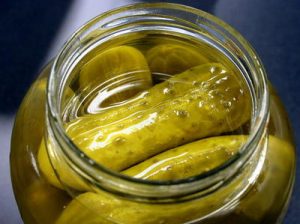Friend of barfblog and mentor Tanya MacLaurin told me a story when I was in grad school that I still use when telling folks about physical hazards.
It goes sorta like this (or this is the version I remember):
Tanya was running food services at Kansas State and had a really big event with donors and university administrators. She came into the kitchen and saw her staff picking something out of a couple of hundred of salads that were prepped and ready to go our for service. Someone had broken a fluorescent light that was situated over the staging area and everyone was scrambling to pick out the glass.
A great risk manager, Tanya shut down the coverup operation.
Glass removal by eyesight isn’t a great critical control point.
In related news, a supplier of Trader Joe’s salads is recalling a whole bunch of prepared salads due to glass contamination.
Green Cuisine, a San Fernando, Calif. establishment, is recalling approximately 36,854 pounds of chicken and turkey salad products that may be contaminated with extraneous materials, specifically hard silica and glass fragments, the U.S. Department of Agriculture’s Food Safety and Inspection Service (FSIS) announced today.
The ready-to-eat chicken and turkey salads were produced from Nov. 4 – 15, 2017. The following products are subject to recall:
* 10.5-oz. clear plastic individual serving packages containing “TRADER JOE’S White Meat Chicken Salad with celery, carrots and green onions” with a “Use By” date of November 10 – 21, 2017.
* 11.0-oz. clear plastic individual serving packages containing “TRADER JOE’S CURRIED WHITE CHICKEN DELI SALAD with toasted cashews, green onion and a bit of honey” with a “Use By” date of November 10 – 21, 2017.
* 10.25-oz. clear plastic individual serving packages containing “TRADER JOE’S TURKEY CRANBERRY APPLE SALAD TURKEY BREAST MEAT WITH SWEET DRIED CRANBERRIES, TANGY GREEN APPLES, PECANS AND SAGE” with a “Use By” date of November 10 – 21, 2017.
The products subject to recall bear establishment number “P-40299” inside the USDA mark of inspection. These items were shipped to retail locations in the following states: Arizona, California, Colorado, Idaho, Louisiana, New Mexico, Nevada, Oklahoma, Oregon, Texas, Utah and Washington.








